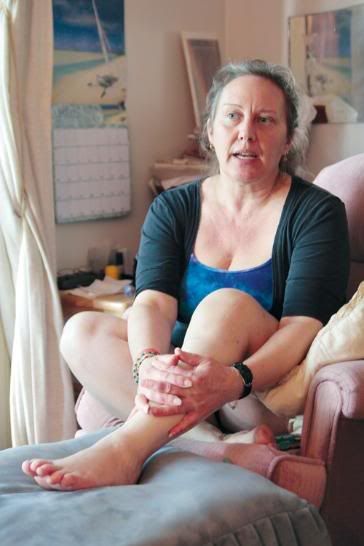« Vancouver Global Marijuana March | Main | 101 Free Hemp Burgers at Courthouse »
Nanaimo advocate eyes Ontario marijuana ruling
By admin | May 15, 2011
Nanaimo advocate eyes Ontario marijuana ruling
Pam Edgar, a medicinal marijuana advocate and user, wonders
what a recent Ontario superior court ruling against the federal government’s marijuana medical access regulations will mean for patients in Nanaimo and across Canada who use marijuana
to alleviate disease symptoms.
Chris Bush/The News Bulletin
By Chris Bush – Nanaimo News Bulletin
Published: May 13, 2011 10:00 AM
Updated: May 13, 2011 4:09 PM
A recent Ontario superior court ruling against the federal government’s medical marijuana regulations has a licensed medical marijuana user in Nanaimo wondering where she and other patients across Canada stand legally.
Pam Edgar, host producer of CHLY Radio program Living Health, is a medical marijuana advocate. She is also a patient who uses the drug to control chronic pain from nerve and bone damage to her left leg from a motorcycle accident in 1975 and muscle spasms triggered by multiple sclerosis, which she was diagnosed with in 1988.
The Ontario superior court tossed out the federal government’s regulations on medical marijuana access in a ruling, brought down April 12, from a constitutional challenge by Matthew Mernaugh, a patient in Ontario who uses the drug to alleviate symptoms from several medical conditions.
The court found the government regulations, which only allow patients to go through allopathic physicians to access medical marijuana, made obtaining it too restrictive and difficult to legally acquire it.
The ruling effectively struck down sections 4 and 7 of the Controlled Drugs and Substances Act prohibiting possession and production of marijuana, and left the government 90 days to legislate new regulations or get an extension beyond the July 12 deadline.
The situation leaves the door open for removal of cannabis prohibition in Canada, which Edgar and other advocates hope will be replaced by a controlled and regulated system of medicinal marijuana production and access.
Edgar said results from recent scientific research support medical marijuana users’ claims it helps alleviate symptoms from a variety of diseases.
“And then our government is going to say, nope, you can’t have that or you can only get it through us – or you can only get it through us when you follow our system and when you follow our system you can only use it the way that we’re going to prescribe you do?” she asked. “That’s not good.”
Edgar said the same controls and regulations pharmacies already apply when they dispense drugs to ensure those drugs are used responsibly should apply to medical marijuana. She added it also should be grown tailored to its medicinal qualities instead of for its psychoactive properties as illegal growers do now, which she said is an irresponsible abuse of the drug.
But some of marijuana’s side effects, such as increased appetite, are desirable for certain patients.
Many pharmaceuticals have negative and, in some cases, dire side effects. A synthesized marijuana derivative she agreed to try at one point impaired her ability to think clearly.
“It turns me into an absolute goof,” she said. “I cannot handle the side effects.”
Edgar said she and a few other licensed patients in Nanaimo grow their own marijuana in a specific location, which allows them to control its quality and avoid using synthetic drugs.
Getting licensed to grow and possess marijuana has its complications.
Edgar must renew the licence annually, which includes providing a photograph of herself and extensive personal information, and the time from when she makes the application to receiving the licence can take several months.
In 2010, when her licence was scheduled to expire in August, she submitted her licence renewal in May, but did not receive her new licence until November. The delay left her in a form of legal limbo for months. Following the rules, though, allows her to maintain her status as a legitimate medical marijuana user and advocate.
Edgar has always been forthright with her doctors – even 20 years ago when such conversations were not broached easily with the those in the medical profession – about choosing marijuana over pharmaceuticals.
“They could have said, ‘You know what? I don’t want to be your doctor,’” she said. “Fortunately, we had a really good relationship and they supported me – not necessarily agreed, but they supported me. Twenty years later I’m now getting pats on the head.”
The ultimate decriminalization of marijuana for medicinal use in Canada would be desirable, but she admits many political and economic hurdles stand in the way.
“It’s gotten away from the compassion and the treatment and care of the patient and its gotten down to politics and economics,” she said.
Topics: Articles | Comments Off
Comments are closed.
